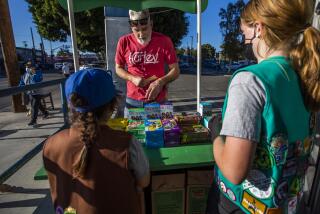Cookie Sales Get a Corporate Flavor
- Share via
As upward of 140,000 Girl Scouts hit the streets of Southern California this weekend to begin their annual cookie sale, customers will be seeing less of that dowdy fixture of yesteryear: the card table at the supermarket.
These days, Scouts in the region’s 10 district councils are turning increasingly to sophisticated, corporate-inspired sales strategies -- faxes, e-mail, telephone sales and mobile booths -- to peddle Trefoils, Thin Mints and six other varieties of cookies that are part of a seven-decade Scout tradition.
Even 13-year-old Kimberly Ruiz of Chatsworth, who sold 1,413 boxes last year, said tapping every possible sales technique is the way to go in these competitive times. “I think the cookies sort of sell themselves, but customers have to know we’re out there and that they can use whatever way is easiest to put in their orders,” Ruiz, who was the San Fernando Valley’s champion salesgirl, said Saturday.
To be sure, history retains a strong hold on the organization, now in its 91st year. Among the practices that go back decades in the United States is the cookie sale’s kickoff rally, such as the one Saturday at Pierce College in Woodland Hills. As nearly 1,000 girls stomped their feet and screamed at ear-splitting volume, adult leaders urged them to pattern their sales around this year’s national sale theme -- “Dream Big” -- so they can raise money to spend a day at Catalina Island or a week at camp.
And, troop leaders say, some girls prefer to stick to the tried and true by primarily selling door-to-door in their neighborhoods, or having their parents work their friends at the office.
But at the urging from national headquarters, Scout officials in Southern California and around the country are mimicking highly successful organizations such as Amway and Mary Kay by adding entrepreneurial skills like goal-setting and networking to the once-simple formula of using a smile to make a sale. Parents at the rally said they welcome the new approach.
“I think it’s wonderful,” said Maria Perser of Winnetka, whose 12-year-old daughter, Elizabeth, has been in Scouting five years. “I was in Girl Scouts as a kid, and we were just given the stuff and told to get out there. Now, they give them some marketing tools.”
The plain, old wagon that once hauled boxes of Trefoils and Thin Mints door-to-door is now a “cookie conveyance” complete with a theme and attention-drawing decorations. And no high-tech tool is out of reach. A major communications company set up a telemarketing-style phone bank at one recent rally so girls could make their first sales to friends and relatives.
The cookie sale’s makeover reflects a determined effort by the Girl Scouts’ New York City main office to stay relevant in girls’ lives, after climbing back from years of declining membership and shedding the squarish image of girls in green jumpers singing songs around the campfire. Scout membership is now at a 21-year high of 2.8 million, after peaking in 1969 at 4 million.
Not everyone, however, is pleased with the change. One mom at Saturday’s rally, who asked not to be named, said the cookie sale has become more money-centered and less fun. “It seems parents are selling the cookies rather than the girls. I don’t plan on selling anything.”
Organization leaders say the cookie sale is anything but a cop-out to commercialism. Rather, they tout the expanded strategies as a way of giving girls practical skills useful in any career or calling -- the equivalent of putting a life lesson in every box.
“We look at the cookie sale as an educational opportunity rather than a selling activity,” said Sheila Lewis, program advisor for Girl Scouts USA. “It’s always been a cornerstone of the Girl Scouts, and it changes with the times. Right now, we use the program to develop financial literacy and management skills.”
The approach has an enthusiastic fan in Sydney Simon, 14, of Reseda, who happily reports she’s learned how to deal with large sums of money “and to make sure we’re not falling short” when it’s time to pay for the cookies the troop has ordered. A more sobering lesson that’s been driven home to her is that not everyone can be trusted. “Sometimes, people, especially guys, ask me to come in their houses. I say no and walk away. That’s a sale I don’t care if I lose.”
Dealing with sale profits has changed to match today’s globalized economy as well. Jill Preston, program director of the 10,000-member Angeles district covering much of the city of Los Angeles, remembers being a Scout in the 1980s, when the cookie sale was mostly about raising money to go to Disneyland. “Now, we have troops traveling the world,” she said.
The cookie sales have kept pace with the times in other ways. Girls delve into their e-mail address books to hit up friends or far-flung family members, said Tami Kessler, 15, of Woodland Hills. “But I don’t send e-mails to strangers.” Official Girl Scout instruction booklets also encourage the use of fax machines to solicit sales from known parties.
“The cookie sale is more polished and more sophisticated than it used to be,” Preston said. “But it still boils down to: How do you get people interested? How do you display what you sell?”
Another innovation making the rounds is “mobile boothing,” which is replacing the lowly card table. Simply put, it’s girls using carts, wagons, wheelbarrows, even baby strollers to move their wares from venue to venue. With markets and superstores increasingly worried about liability, Scouts are finding they can’t always set up shop in high-traffic areas.
So they give their rolling booth a theme, such as “Where Do Sale Proceeds Go?” or “What We Do at Camp” and deck it out with color photos, posters or themed knickknacks. Then it’s off to the park where the soccer games are held, then over to the library, or off to the skate park, “and they can just roll through the crowd,” said Carol Cook, assistant executive director of the San Fernando Valley Council.
Essentially, much of the cookie sale is about the very business-like concepts of laying plans, making decisions and networking -- scaled down to a level that girls age 5 and up can grasp.
“It’s a whole list of things. Do we have to wear our uniforms? Do we need transportation? Do we need to bring change and how much? The girls have to decide what to do with the proceeds, which is a whole process in itself,” said Teri Flotron, marketing director for the San Fernando Valley district.
Other benefits also come into play, troop leaders say. Girls hone communication skills when they approach customers and describe the different cookies available or explain how the proceeds will be used.
Elementary math skills get a workout when Scouts tally up order sheets and make change. Troop members must learn the basics of ethics and fair-business practices.
Goal-setting has become a major component of the cookie sale, and Girl Scout literature cites it repeatedly. Troops often decide in advance what they want to do with their cookie proceeds. Then they set a goal for the number of packages they must sell.
Officials say none of the profit goes to the national headquarters, remaining instead with the nation’s 317 local councils. For every $3 box sold this year in Southern California, about 70 cents will go to the bakery company, about 50 cents to the troop and the rest to fund councilwide programs such as Scout-owned campgrounds and award ceremonies. More than 100 million boxes are sold nationally each year.
Profits often are channeled into trips, but Southern California Girl Scouts have also donated them to such charities as foster care agencies and homeless shelters.
Goal-setting, some say, puts pressure on the girls -- or their parents -- to sell even when it doesn’t appeal to them. This year, girls in the San Gabriel Valley’s Mt. Wilson View Council received letters stating that the per-girl sales goal is 145 boxes, miffing some parents.
But a basic Girl Scouts USA precept is that no girl is ever forced to sell a box of cookies, said Lewis, the national program advisor. “We ask them to devise a different plan, one that says, ‘What can I bring to this?’ She might say, ‘I’m not a good public speaker, but maybe I can do some great posters for my troop.’ Not every girl wants to be a salesperson.”


